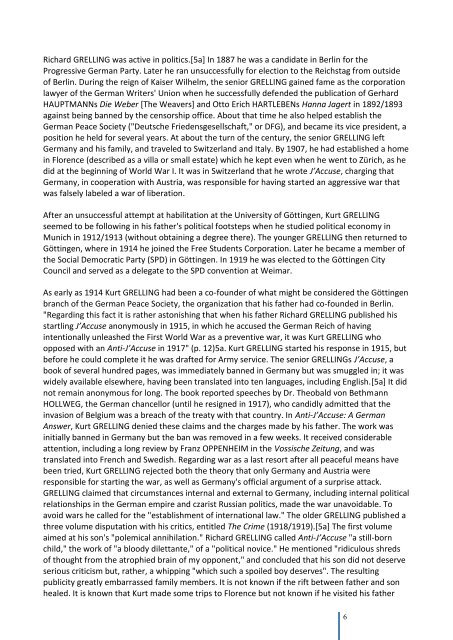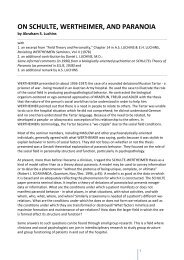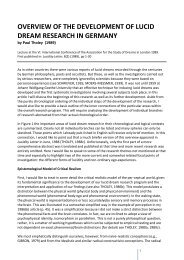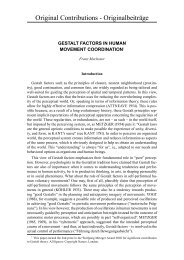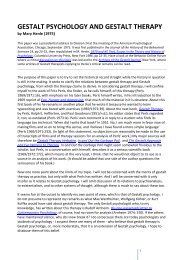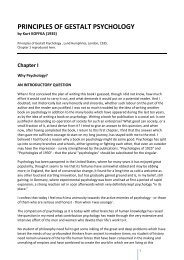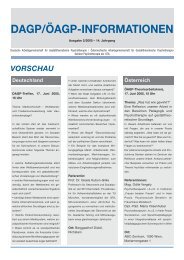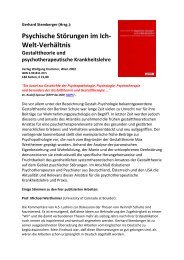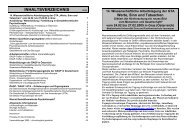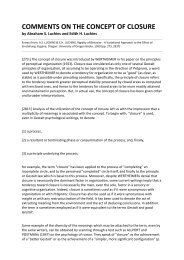pdf-Download - Society for Gestalt Theory and its Applications (GTA)
pdf-Download - Society for Gestalt Theory and its Applications (GTA)
pdf-Download - Society for Gestalt Theory and its Applications (GTA)
You also want an ePaper? Increase the reach of your titles
YUMPU automatically turns print PDFs into web optimized ePapers that Google loves.
Richard GRELLING was active in politics.[5a] In 1887 he was a c<strong>and</strong>idate in Berlin <strong>for</strong> the<br />
Progressive German Party. Later he ran unsuccessfully <strong>for</strong> election to the Reichstag from outside<br />
of Berlin. During the reign of Kaiser Wilhelm, the senior GRELLING gained fame as the corporation<br />
lawyer of the German Writers' Union when he successfully defended the publication of Gerhard<br />
HAUPTMANNs Die Weber [The Weavers] <strong>and</strong> Otto Erich HARTLEBENs Hanna Jagert in 1892/1893<br />
against being banned by the censorship office. About that time he also helped establish the<br />
German Peace <strong>Society</strong> ("Deutsche Friedensgesellschaft," or DFG), <strong>and</strong> became <strong>its</strong> vice president, a<br />
position he held <strong>for</strong> several years. At about the turn of the century, the senior GRELLING left<br />
Germany <strong>and</strong> his family, <strong>and</strong> traveled to Switzerl<strong>and</strong> <strong>and</strong> Italy. By 1907, he had established a home<br />
in Florence (described as a villa or small estate) which he kept even when he went to Zürich, as he<br />
did at the beginning of World War I. It was in Switzerl<strong>and</strong> that he wrote J’Accuse, charging that<br />
Germany, in cooperation with Austria, was responsible <strong>for</strong> having started an aggressive war that<br />
was falsely labeled a war of liberation.<br />
After an unsuccessful attempt at habilitation at the University of Göttingen, Kurt GRELLING<br />
seemed to be following in his father's political footsteps when he studied political economy in<br />
Munich in 1912/1913 (without obtaining a degree there). The younger GRELLING then returned to<br />
Göttingen, where in 1914 he joined the Free Students Corporation. Later he became a member of<br />
the Social Democratic Party (SPD) in Göttingen. In 1919 he was elected to the Göttingen City<br />
Council <strong>and</strong> served as a delegate to the SPD convention at Weimar.<br />
As early as 1914 Kurt GRELLING had been a co-founder of what might be considered the Göttingen<br />
branch of the German Peace <strong>Society</strong>, the organization that his father had co-founded in Berlin.<br />
"Regarding this fact it is rather astonishing that when his father Richard GRELLING published his<br />
startling J’Accuse anonymously in 1915, in which he accused the German Reich of having<br />
intentionally unleashed the First World War as a preventive war, it was Kurt GRELLING who<br />
opposed with an Anti-J’Accuse in 1917" (p. 12)5a. Kurt GRELLING started his response in 1915, but<br />
be<strong>for</strong>e he could complete it he was drafted <strong>for</strong> Army service. The senior GRELLINGs J’Accuse, a<br />
book of several hundred pages, was immediately banned in Germany but was smuggled in; it was<br />
widely available elsewhere, having been translated into ten languages, including English.[5a] It did<br />
not remain anonymous <strong>for</strong> long. The book reported speeches by Dr. Theobald von Bethmann<br />
HOLLWEG, the German chancellor (until he resigned in 1917), who c<strong>and</strong>idly admitted that the<br />
invasion of Belgium was a breach of the treaty with that country. In Anti-J’Accuse: A German<br />
Answer, Kurt GRELLING denied these claims <strong>and</strong> the charges made by his father. The work was<br />
initially banned in Germany but the ban was removed in a few weeks. It received considerable<br />
attention, including a long review by Franz OPPENHEIM in the Vossische Zeitung, <strong>and</strong> was<br />
translated into French <strong>and</strong> Swedish. Regarding war as a last resort after all peaceful means have<br />
been tried, Kurt GRELLING rejected both the theory that only Germany <strong>and</strong> Austria were<br />
responsible <strong>for</strong> starting the war, as well as Germany's official argument of a surprise attack.<br />
GRELLING claimed that circumstances internal <strong>and</strong> external to Germany, including internal political<br />
relationships in the German empire <strong>and</strong> czarist Russian politics, made the war unavoidable. To<br />
avoid wars he called <strong>for</strong> the "establishment of international law." The older GRELLING published a<br />
three volume disputation with his critics, entitled The Crime (1918/1919).[5a] The first volume<br />
aimed at his son's "polemical annihilation." Richard GRELLING called Anti-J’Accuse "a still-born<br />
child," the work of "a bloody dilettante," of a "political novice." He mentioned "ridiculous shreds<br />
of thought from the atrophied brain of my opponent," <strong>and</strong> concluded that his son did not deserve<br />
serious criticism but, rather, a whipping "which such a spoiled boy deserves". The resulting<br />
publicity greatly embarrassed family members. It is not known if the rift between father <strong>and</strong> son<br />
healed. It is known that Kurt made some trips to Florence but not known if he visited his father<br />
6


